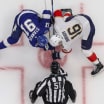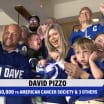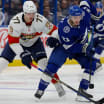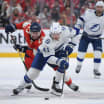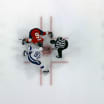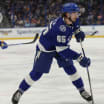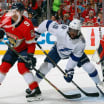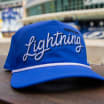While at AMALIE Arena a couple weeks ago reporting on a story about the day the NHL paused, I was surprised to see my boss Bill Wickett, the Tampa Bay Lightning's executive vice president of communications, inside the arena's security command center.
Wickett explained he was working a shift with the security team. During the pause with decreased activity at the arena, full-time Lightning staffers were helping out security by providing an extra set of hands to assist with greeting visitors, logging people in and out and taking temperatures of everybody who enters the building.
I thought to myself, "Hmm, working security might make an interesting story."
So I asked if I could sign up for a shift. And I decided to document my experience to see share what it's like working security for an empty arena with no events.
A shift with Amalie Arena security
Bryan Burns spent a night shadowing the security staff keeping a 24-hour eye on the home of the Bolts
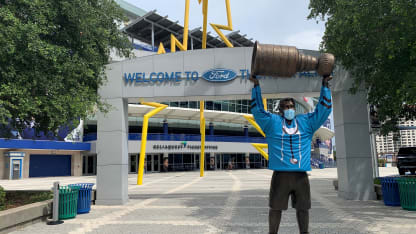
On Tuesday, I set up in the command center alongside Tampa Bay's director of safety and security Daryl Niles and safety and security supervisor Kevin Eshelman. During my 4 p.m. to midnight shift, the two showed me the basics of the command center, let me assist on security rounds inside and outside the arena and answered all of my, admittedly, numerous questions about their jobs.
The shift proved to be educational. I got to learn about the inner workings of the arena. I saw doors and corridors I didn't even know existed, one I walk by every day (during the season) I never noticed.
And, quite frankly, the shift was a bit lonely too with basically just myself, Daryl and Kevin around.
What follows is a chronological journal of the night.
4 p.m. - Security shift starts
4:05 p.m. - For the first couple of minutes, the guys explain what goes on during a typical day, particularly now that so few people are entering the arena. Some outside contractors have been coming in during normal business hours to upgrade the facility's WiFi and a handful of full-time staffers enter to complete some portion of their work.
The command center is fairly small, maybe the size of a one-car garage. On one wall is a bank of TV monitors showing a live video feed from cameras set up inside and outside the arena. On the other wall is a long window that looks out into the players' parking lot.
I'm handed a sheet of paper with command center instructions. Some of the guidelines include:
- Wear comfortable shoes. You'll be walking a lot.
- Stay hydrated.
- Everything learned or taught is strictly confidential (hmmm, I wonder if that applies to this article).
4:19 p.m. - Daryl shows me a picture on his phone of himself nine weeks after the NHL pause. Unable to get a haircut during this time and with his white beard/mustache combo, he's a dead ringer for Ernest Hemingway, and I tell him as much.
"You're the third person that's told me that," he replies.
4:30 p.m. - Our attention is turned to a TV in the command center tuned to the NHL Network. NHL commissioner Gary Bettman is announcing the League's Return to Play plan for 2019-20. By now, you've heard all the major elements.
- The 2019-20 regular season is complete
- 24 clubs will comprise the 2020 Stanley Cup Playoffs
- The top four teams in each conference will receive a bye while the remaining eight teams in each conference will compete in a best-of-five qualifying round for the right to move on to the field of 16.
- Formal training camps will begin no earlier than July 1
- The list of potential hub cities has been trimmed to 10, Tampa not being one of them despite the organization expressing a desire to be included. Those 10 are: Chicago, Columbus, Dallas, Edmonton, Las Vegas, Los Angeles, Minneapolis/St. Paul, Pittsburgh, Toronto and Vancouver.
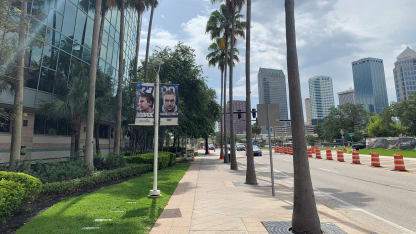
5:07 p.m. - We do our first exterior security check of the arena. Daryl tells me they do six of these a day, twice on each shift at random times. There are three shifts in the security command: 8 a.m. to 4 p.m., 4 p.m. to midnight and midnight to 8 a.m.
The security check involves walking around the perimeter of the arena, making sure all doors that are supposed to be locked are locked. And just keeping our eyes open for anything that looks out of place. Having been stuck inside my house most of the day before coming to the arena and spending the first hour of the shift holed up inside the command center, it's a welcome change of pace to get some fresh air and feel the sun on my face.
5:12 p.m. - There's a checklist I fill out as we go along to make sure we've secured every area of the arena that needs to be secured. One of the doors on the checklist is labeled the Romney Door. I ask why since all the other doors have generic names like SW Quadrant or NW Stairwell.
"In 2012 when we hosted the Republican National Convention, this is the door (Republican presidential candidate) Mitt Romney would use to sneak in and out of the arena away from the public," Daryl explains.
The name has stuck ever since.
No, I'm not revealing which door is the Romney Door.
5:13 p.m. - When we get to the Corona Cantina on Ford Thunder Alley, Daryl tells me another security officer making the rounds a couple days earlier saw a litter of 10 kittens inside but when we peek inside the Cantina there's nothing to be found. If we see them again, we'll call The Humane Society, Daryl says.
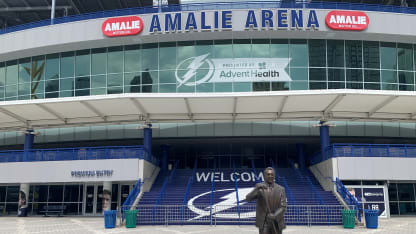
5:20 p.m. - The main entrance to the arena has bike racks covering the base of the stairs to keep people from using them for exercise purposes. It's a liability issue, Daryl explains.
We move one of the racks to the side to climb the stairs and check that the doors to the main entrance are locked. There's a pretty decent buildup of dust on pretty much every surface on the porch and around Ford Thunder Alley from the construction that continues on the adjacent J.W. Marriott hotel that is near completion. Once the arena opens back up, a deep pressure washing will be in order.
5:47 p.m. - Daryl and I complete our rounds and return to the command center. As we enter, the phone is ringing. Kevin gets up from his seat and walks over to the phone to answer, explaining this is the fifth call he's fielded since we left for our exterior rounds. With nobody sitting at the administration entrance, all incoming calls are re-routed to the security command. Kevin says the majority of the calls have been hockey related from fans having watched Bettman's Return to Play announcement and wanting to know more about playoffs, tickets, refunds, etc.
This particular caller wants to make sure the Elton John concert scheduled for tonight is definitely postponed and asking if a reschedule date has been announced. On the back wall of the command center, there is a calendar white board with the next three months of events listed. Today's date shows Elton John with a black X through it. Most of the dates have an X through them as events continue to be postponed or cancelled.
"Bryan, you would not believe some of the calls we get," Kevin says after politely assuring the caller the Elton John show hasn't somehow slipped under the radar of stay at home orders. "I had someone call a couple days ago asking if the Blue Lot was still available to park in."
There's now a 21-story building under construction on what used to be the Blue Lot, which hasn't been available for at least two years now by my estimation.
6:13 p.m. -- Gabe Marte stops by the security compound on his way out of the building to check out. Marte is the digital video manager for the Lightning and has been putting the finishing touches on the now uber-viral Alex Killorn video - the Bolts are Back (in small groups) -- the Bolts forward posted to his social channels Thursday.
Marte gives me a sneak peak of the video from his phone.
"This is gold," I tell him.
I'll have more from Marte and others who helped produced this fantastic piece of content in a behind-the-scenes look at the making of the video next week.
Tweet from @Akillorn19: The moment @NHL says you can skate again! #boltsflytogether #directorialdebut #breakoutinfluenceroftheyear pic.twitter.com/YiSD8kjV88
6:45 p.m. - Kevin is showing me how some of the instruments in the command center work. With all of the outside contractors out of the building, it's time to turn off most of the lights in the arena. He brings me over to a control panel on the wall.
"Probably eighty percent of the lights are controlled by this panel," he explains.
After punching in a sequence on the numerical pad, the lights are scheduled to turn off. We watch on the video monitors next to the panel as one by one each goes dark in a different section of the arena - concourses, office space, corridors - until they're all shut off. It's pretty cool to see.
7:13 p.m. - It's time to do an interior check of the arena. It's pretty much just like the exterior check, going through each area and making sure doors that are supposed to be locked are locked and everything's as it's supposed to be.
When we open the door to the locker room corridor, that familiar smell of rubber flooring used to protect the sharp blades of ice skates hits. It's a scent pretty unique to hockey, one I'm used to smelling unnoticed every day during the season but haven't gotten a whiff of in quite some time.
It makes me nostalgic for hockey to restart.
7:40 p.m. - As we're wrapping up our interior check, I comment to Kevin about how there's not really a lot to do because there's nothing going on in the building currently. Seems like it would be hard to stay focused during a time like this.
Kevin explains that's probably the most difficult aspect of the job, being vigilant when it seems unnecessary.
"About 98 percent of the time, there's nothing to do. It can get boring," he says. "But two percent of the time, your hair's on fire. You have to remain ready for that two percent and not let the 98 percent take your focus away."
7:57 p.m. - We get back to the command center, and it's dinner time. Daryl ordered Domino's, and now we have two large pepperoni and sausage pizzas awaiting us as we enter.
"You guys came back just in time. Must have smelled it," Daryl jokes.
8:15 p.m. - After eating, with daylight quickly fading and nothing going on inside or outside of the arena, much of the conversation in the room turns to hockey. We talk about the restart, whether the four teams that get a bye in each conference - the Lightning included - are at a disadvantage because the other eight teams in the conference are playing do-or-die playoff games while the teams with a bye are playing a less important round robin for seeding purposes.
We discuss what it will be like in the arenas once the season resumes. We argue the merits of each of the hub cities, which ones we would want to be holed up in for potentially over a month if we were players.
It's good conversation and it helps to break up some of the monotony of the job.
"I always thought it would be cool to talk sports for a living, like a Chris Berman," Daryl says.
"You do that anyway," Kevin quips, "You just don't get paid for it."
8:47 p.m. - Daryl goes in his office next to the command center to fill out some paperwork. The opportunity alone with Kevin gives me a chance to find out a little more about his background. During the season, I see him almost on a daily basis. But because of the nature of our jobs, we've never really talked outside of exchanging pleasantries.
It's interesting to note the similarities we share. He's from Harrisonburg, Virginia, about an hour and a half down Interstate 81 from my hometown of Charles Town, West Virginia. We both grew up on farms, although Kevin still prefers the rural lifestyle at his Lithia home while I like the city life of my urban setting in St. Petersburg.
One day when he and his wife and children were living in Virginia, his wife asked Kevin if he really wanted to spend his whole life in rural Virginia. He liked the area well enough but admitted it might be fun to live elsewhere, somewhere with better weather and more things to do.
On a whim, they decided to move to the Tampa having never been to the city. They'd also considered Dallas, Houston and parts of southern Texas. Kevin started as a part timer at the arena before working his way up into his current role.
I have a similar story about moving to Tampa. Having graduated college and moving back to my hometown, myself and two of my buddies decided there wasn't much happening in our area and we needed to get out. We considered Tampa, Boston and San Diego before settling on Tampa because of the weather and it being on the East Coast and still relatively easy to get home if need be.
None of us had jobs either.
I imagine if you talk to other transplants who've moved to the Tampa Bay area, you'll hear similar stories.
9:25 p.m. - Not going to lie, the shift is pretty dull at this point. We haven't seen another person in over an hour. Even the monitors showing video of the streets surrounding the arena are uneventful as most of the earlier activity involved people exercising but those people have now returned to their homes. The only movement comes from the construction crews across the street working 24/7 on the high-rise apartment building at 815 Water Street.
"It's not a bad shift until about 10 p.m., but those last two hours feel like they can take forever," Daryl says.
9:45 p.m. - The First 48 is on the TV inside the command center. We're simultaneously keeping an eye on the video monitors showing camera feeds inside and outside the arena while listening to a murder investigation on the TV where some guy named Fat Boy is being questioned for killing Smoke.
With a name like Fat Boy, I expect to look up and see a behemoth. Instead, I see a tall, lean guy.
Now I feel like I have to find out how Fat Boy got his nickname.
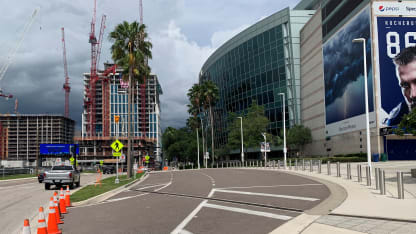
9:51 p.m. - Kevin and I are doing our final outdoor check of the arena for this shift. Before we exit the compound, he shows me a video on his phone from a few days prior of a humongous raccoon climbing along the window separating the compound from the outside.
"He jumped up in the window, and Eddie about fell out of his chair he was so big," Kevin laughs, referring to another member of their security team.
It's definitely the largest raccoon I've ever seen.
10:11 p.m. - As we make our way to the 15-minute circle, we notice two cars have moved the orange construction cones blocking the entrance and are parked in the circle.
"Let's go find out why these cars are here," Kevin says.
The cars are empty. Kevin puts his hand near the hood of each.
"They're still warm," he says.
He pulls out his walkie-talkie and asks Daryl in the compound to check the security tape and see when the cars entered the circle. Also, to see if he can identify the people who drove them there and where they went.
I start to get a little nervous. Is this the two percent Kevin was talking about earlier? I suddenly realize I look pretty nerdy walking behind a security guard with nothing but a reporter's notepad and a pen doggedly jotting every random thing I see down. If things are about to go down, I'm ill-equipped to assist.
I look over toward the stage on Ford Thunder Alley and notice a cameraman is setting up his camera to face AMALIE Arena while a reporter stands in front holding a microphone. They're from the local Fox 13 news team, doing a live hit in front of the arena about Bettman's Return to Play briefing.
Crisis adverted.
Kevin approaches the reporting crew to make sure the cars belong to them, which they affirm. They'll leave a couple minutes later, taking probably all of 10 minutes from the time they arrive to exiting to record their report.
Kevin jokes to Daryl over the walkie talkie: "We can call off the tow trucks."
The rest of the perimeter check goes off without a hitch.
This would be the most excitement of the entire shift.
11:03 p.m. - In addition to the arena, security also checks the Embarc Collective building on the north side of the Crosstown Expressway on Whiting Street. Kevin's going to drive over to do the check, and I hop in the passenger side of his car.
It's pretty much the same as an arena check, pulling doors to see that they're secure, making sure there's nothing suspicious around. When we get back to the arena, Kevin pulls up the camera feeds from Embarc on one of the monitors to show me how everything's recorded and how clean the image is. We can see Kevin's car driving down the street before parking, the two of us walking around the perimeter. At one point, Kevin zooms in closely to both of our faces, showing how easy it would be to give an accurate description of someone should the need arise.
After looking at myself on camera, I determine I really need a haircut.
11:45 p.m. - 15 minutes to go on the shift. In a few moments, another crew will come in to relieve us. As the night is wrapping up, Daryl is talking about his background. He's originally from Boston but moved around a bit as part of a military family. Before coming to Tampa, Daryl lived in Seattle, working in security for the Seattle Seahawks and Seattle Sounders FC.
Daryl explains he was a pretty good baseball player in high school. An outfielder with an above average arm who batted in the two spot. He had a two-year scholarship opportunity to play at Purdue but went into the Army instead.
Daryl still considers himself an athlete even though his baseball playing days are in the rear-view mirror. He recalls a story where he told Lightning senior director of broadcasting, programming and communications Brian Breseman he thinks he could catch a Nikita Kucherov slap shot from the top of the point but only if he's allowed to wear a glove on each hand.
"Kucherov would kill you," Breseman laughs.
We all agree it probably wouldn't be a good idea for Daryl to test out his theory.
12 a.m. - And on that note, the night is over. Our security shift ends and the midnight to 8 a.m. crew relieves us. I thank Daryl and Kevin for letting me tag along, plop my tired body into my car and think, "Man, I'm glad I didn't have to experience that two percent."


